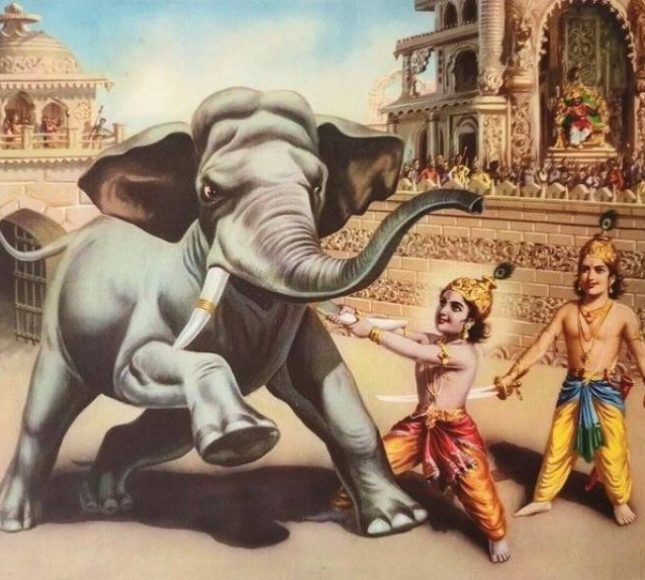KUVALAYAPIRA My Lord, in the form of a child killed Kuvalayapira. (Sorath M. 4, p. 606) The tyrant king Kansa, in order to kill Krishna and Balarama sent this demon. He was in the form of an immense elephant and was employed to trample both the young boys under his feet. He did not succeed in his mission and was killed by Krishna.
References :
1. Kohli,Surindar Singh ed,Dictionary of Mythological References in Guru Granth Sahib 1993
Kuvalayapida is central to the dramatic events leading up to the confrontation between Krishna and Kamsa in Hindu mythology. It is said that Kamsa, the tyrannical king of Mathura, owned Kuvalayapida, a massive and ferocious elephant that was kept at the entrance of the wrestling arena. Kamsa harbored a deep fear of Krishna due to the prophecy that foretold Krishna’s destiny to end his reign.
As Krishna and his elder brother Balarama arrived at the arena, Kamsa ordered Kuvalayapida to attack them, intending to eliminate Krishna before he could fulfill the prophecy. Kuvalayapida charged toward Krishna with its massive strength, symbolizing brute force and oppression.
However, Krishna, who is considered the avatar of Vishnu and embodiment of divine power, confronted the elephant fearlessly. The encounter between Krishna and Kuvalayapida is described vividly in texts like the Bhagavata Purana and Harivamsha. Krishna skillfully dodged the elephant’s attacks and ultimately subdued it. In a display of unparalleled might, Krishna lifted Kuvalayapida and hurled it to its demise.
This episode holds symbolic significance in Hindu mythology. Kuvalayapida represents the obstacles and challenges posed by oppressive forces, while Krishna’s victory symbolizes the triumph of righteousness and divine will over tyranny. The story is often viewed as an allegory for overcoming adversity with courage and divine strength.
The defeat of Kuvalayapida paved the way for Krishna to confront Kamsa himself, marking a turning point in the larger narrative of Krishna’s life and mission. This tale is a powerful reminder of the inevitability of justice and the ability of divine power to conquer evil.



